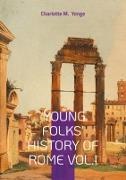Read more
' Young Folks History Of Rome Vol.I ' by Charlotte M. Yonge chronicles the rise of Rome from its mythical origins to the early Republic, tailored for young readers. Yonge blends legends like Romulus and Remus with historical events such as the Sabine integration and the reign of Servius Tullius, presenting complex political evolution through accessible storytelling. Her narrative balances military conquests, societal structures, and religious customs, emphasizing moral lessons and civic virtues central to 19th-century educational values.
The book meticulously details Romes foundational myths, including Aeneass journey and the establishment of the Senate, while contextualizing cultural practices like the Saturnalia festival and the role of augurs. Yonges structured approach demystifies early Roman governance, from the division between patricians and plebeians to the significance of the Twelve Tables. Vivid descriptions of daily life-such as the toga-clad citizens and the reverence for household gods-immerse readers in antiquity without overwhelming detail.
Ideal for educators and parents, this volume bridges myth and scholarship, offering a gateway to classical studies while aligning with modern curricula on ancient civilizations.
About the author
Charlotte Mary Yonge (1823.1901), a cornerstone of Victorian childrens literature, dedicated her career to merging moral instruction with historical education. Influenced by the Oxford Movement and her mentor John Keble, she authored over 160 works, including the bestselling The Heir of Redclyffe (1853). Her emphasis on duty and piety resonated with 19th-century audiences, though modern scholars also critique her conservative social frameworks.
' Young Folks History Of Rome Vol.I ' exemplifies her ability to simplify complex historical narratives without sacrificing depth. Yonges editorial role at The Monthly Packet, a magazine for young women, further solidified her reputation as a cultural educator. Despite her focus on Anglican values, her works remain pivotal for their literary craftsmanship and pedagogical clarity.

